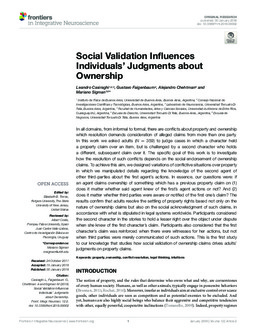| dc.rights.license | https://www.frontiersin.org/journals/integrative-neuroscience#open-access | es_AR |
| dc.contributor.author | Casiraghi, Leandro | es_AR |
| dc.contributor.author | Faigenbaum, Gustavo | es_AR |
| dc.contributor.author | Chehtman, Alejandro | es_AR |
| dc.contributor.author | Sigman, Mariano | es_AR |
| dc.date.accessioned | 2018-07-20T14:16:25Z | |
| dc.date.available | 2018-07-20T14:16:25Z | |
| dc.date.issued | 2018-06-30 | |
| dc.identifier | doi: 10.3389/fnint.2018.00002 | es_AR |
| dc.identifier.uri | https://www.frontiersin.org/articles/10.3389/fnint.2018.00002/full | es_AR |
| dc.identifier.uri | https://repositorio.utdt.edu/handle/20.500.13098/11057 | |
| dc.description.abstract | In all domains, from informal to formal, there are conflicts about property and ownership which resolution demands consideration of alleged claims from more than one party. In this work we asked adults (N = 359) to judge cases in which a character held a property claim over an item, but is challenged by a second character who holds a different, subsequent claim over it. The specific goal of this work is to investigate how the resolution of such conflicts depends on the social endorsement of ownership claims. To achieve this aim, we designed variations of conflictive situations over property in which we manipulated details regarding the knowledge of the second agent of other third-parties about the first agent’s actions. In essence, our questions were: if an agent claims ownership of something which has a previous property claim on (1) does it matter whether said agent knew of the first’s agent actions or not? And (2) does it matter whether third parties were aware or notified of the first one’s claim? The results confirm that adults resolve the settling of property rights based not only on the nature of ownership claims but also on the social acknowledgment of such claims, in accordance with what is stipulated in legal systems worldwide. Participants considered the second character in the stories to hold a lesser right over the object under dispute when she knew of the first character’s claim. Participants also considered that the first character’s claim was reinforced when there were witnesses for her actions, but not when third parties were merely communicated of such actions. This is the first study to our knowledge that studies how social validation of ownership claims drives adults’ judgments on property claims. | es_AR |
| dc.format.extent | 8 p- | es_AR |
| dc.format.medium | application/pdf | es_AR |
| dc.language | eng | es_AR |
| dc.relation.ispartof | Frontiers in Integrative Neuroscience. Vol. 12, art. 2, (jan. 2018). ISSN: 1662-5145 | es_AR |
| dc.rights | info:eu-repo/semantics/openAccess | es_AR |
| dc.subject | Propiedad privada | es_AR |
| dc.subject | Derecho a la propiedad | es_AR |
| dc.subject | Solución de conflictos | es_AR |
| dc.title | Social validation influences individuals’ judgments about ownership | es_AR |
| dc.type | info:eu-repo/semantics/article | es_AR |
| dc.type.version | info:eu-repo/semantics/publishedVersion | es_AR |
| dc.description.filiation | Fil: Casiraghi, Leandro. Instituto de Física de Buenos Aires, Universidad de Buenos Aires, Buenos Aires, Argentina | es_AR |
| dc.description.filiation | Fil: Faigenbaum, Gustavo. Consejo Nacional de Investigaciones Científicas y Tecnológicas, Buenos Aires, Argentina | es_AR |
| dc.description.filiation | Fil: Chehtman, Alejandro. Universidad Torcuato Di Tella, Escuela de Derecho, Buenos Aires, Argentina | es_AR |
| dc.description.filiation | Fil: Sigman, Mariano. Universidad Torcuato Di Tella, Escuela de Negocios, Laboratorio de Neurociencia, Buenos Aires, Argentina | es_AR |

